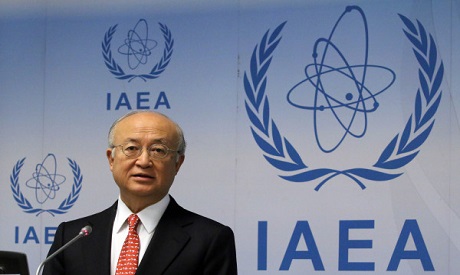
Director General of the International Atomic Energy Agency, IAEA, Yukiya Amano of Japan addresses the media during a news conference after a meeting of the IAEA board of governors at the International Center, in Vienna, Austria, Friday, Jan. 24, 2014 (Photo: AP)
After recent progress with Iran, it is time to tackle "more difficult" nuclear issues such as allegations of past weapons work, the head of the UN atomic watchdog told AFP in an interview.
"We started with measures that are practical and easy to implement, and then we move on to more difficult things," said Yukiya Amano, director general of the International Atomic Energy Agency.
"We certainly wish to include issues with 'possible military dimensions' in future steps ... We have already discussed it and will continue to discuss it at the next meeting" between the IAEA and Iran on February 8, he said.
A November 11 agreement with the IAEA towards improved oversight over Iran's programme included six steps such as this week's visit by IAEA inspectors to the Gachin uranium mine and to a new reactor plant at Arak in December.
But the deal, separate to an accord struck with world powers on November 24 in Geneva, made no specific mention of long-standing allegations that prior to 2003, and possibly since, Iran's nuclear work had what the IAEA calls "possible military dimensions".
Two years of talks between the IAEA and Iran over these accusations, detailed in a major and controversial IAEA report in November 2011 and consistently denied by Iran as being based on faulty intelligence, went nowhere.
But Amano, 66, told AFP that Iran has not been let off the hook, saying that the November 24 accord with world powers made clear that "all past and present issues" must be resolved.
"When we say past and present issues, naturally it includes issues of possible military dimensions," said the Japanese, head of the IAEA since 2009.
How long this takes "very much depends on Iran. It can be quick or it can be long. It really depends on their cooperation," he said.
Under the November 24 deal with world powers, Iran stopped for six months on January 20 enriching uranium to medium levels and began converting its stockpile of this material into a form much more difficult to process into weapons-grade.
This set the clock on Iran and the powers -- the United States, China, Russia, Britain, France and Germany -- negotiating a long-term "comprehensive" accord likely permanently reducing Iran's nuclear programme while removing UN and Western sanctions.
US President Barack Obama has said he sees the chances of such a deal as no more than 50:50, but a smiling Amano, sitting in his office on the 28th floor of IAEA headquarters in Vienna, refused to be drawn into a prediction.
"We are a technical organisation. We focus on facts, we report only facts. Foreseeing the future, speculating the future, is very difficult," he said.
"You could not have foreseen this situation six months ago. A year ago it was completely impossible. One of the things I learned in this profession is that foreseeing things does not help much."
The IAEA has had to double its number of inspectors and increase the frequency of visits to Iran's nuclear facilities in order to verify Iran is sticking to the freeze and converting material as promised.
Amano said that the IAEA would inform member states "without delay" if Iran began to veer away from its commitments in a "significant" way. Otherwise there would be brief "regular" updates and in-depth quarterly reports as normal.
This increased verification role led Amano last week to appeal for some 5.5 million euros ($7.5 million) in extra money, and he said that "more than one dozen" countries have so far committed to contributing.
Short link: